
Every year marks the beginning of new achievements and possible challenges along the way. Are you ready for them as an e-commerce business owner? For example, what about the platform powering your online store? Have you already chosen one?
According to the latest data, the most popular solutions today are Shopify and Magento, each targeting its own audience. So, Shopify vs Magento: What would be best for your project?
We invite you to discuss this topic from our multi-year experience and the upcoming e-commerce trends.
Why Is the E-commerce Platform a Thing?
“It doesn’t matter what platform I use for my online store!” You might argue with us. “My product is good, and that’s the main thing!”
We wish it were true! However, it's not only WHAT you sell that matters but also HOW you sell it. After all, what's the point of having a top-notch product if a customer has difficulty finding it in the online catalog or if your website loads too slowly? Both are easy ways to irritate users and make them leave; moreover, they often go straight to your competitors.
Sounds scary? Well, that’s why you should carefully choose your e-commerce platform. According to our experience, it can make all the difference.
By the way, don't worry if your initial choice was wrong and now you see that another system would be more suitable for your requirements. You can always move to another platform. There have been many Magento to Shopify migration projects and vice versa in our practice, so we're happy to help you, too, whenever you need our professional assistance.
Wanna know more about Magento migration? We've prepared a special piece on this topic, so follow the link for details right away!
The Future of Sales: What Should We Expect?
We guess it's no secret to you that 2020 was a turning point for e-commerce. The coronavirus and the lockdown it caused resulted in explosive global growth in online sales: 46% compared to 2019. As people became accustomed to online shopping during the pandemic and had no intention of giving it up, the industry continued to proliferate.
To finally convince you how important choosing the right e-commerce platform for your online store is, we’d like to share a few useful Insider Intelligence predictions with you:
- The global e-commerce market will reach $8.5 trillion by 2027, up from $6 trillion in 2023.
- Today, there are 2.6 billion consumers buying goods and services online, representing a third of the world's population. And this figure continues to grow.
- By 2028, about 30% of all retail purchases will be made online.
We hope we've convinced you that sales of the future will inevitably be online, which is why you should take your niche in the digital world while it's still possible. The best place to start is by selecting a platform that can ensure your e-commerce business's growth and become a long-term investment.
Deep Dive: Choosing Your E-commerce Engine
Let’s go deeper and show with examples why it's worth weighing all the pros and cons before choosing a certain solution:
- User shopping experience: A seamless journey through your e-commerce website is the key to consistently high sales. As statistics show, next to 90% of users will cross a site off their list if you fail to provide them with the best online shopping experience. Therefore, your platform should offer the necessary functionality for an easy-to-navigate online space.
- Automated e-commerce processes. Make sure the chosen system allows you to automate operations like inventory management, shipping tracking, and payment processing. According to recent data, this can help you boost productivity by at least 20%.
- Project scalability. Did you know that more than half of e-commerce companies suffer from the limitations of their platform, which prevents them from developing at the desired speed? Hopefully, you won't be among them! After all, business growth implies a higher flow of users and a greater number of transactions. Your online store must be ready for this increasing load.
- Ongoing costs. Working with the platform requires investment, whether maintaining the server infrastructure or paying a monthly subscription on a SaaS basis. And it is extremely important to plan your budget in advance.
- Ease of platform management. Some systems require certain skills, including technical ones, to manage them. And if you don't have such expertise, you must hire a team that can handle this task better than you.
As you can see, the choice is tough and important, going far beyond just a technically advantageous solution. It's a strategic move that directly affects your e-commerce business. Moreover, you may need professional Magento and Shopify development services, provided you agree with us that these two platforms lead today's market.
Okay, it’s time to discuss these giants in more detail so that you understand how they’ve earned their popularity and become the top choice in the current market. What do they offer e-commerce businesses? What makes them different?
Shopify vs Magento: The Platforms at a Glance
There is no winner in the Shopify vs Magento battle, for each platform is good in its own way. The trick is to figure out what you actually need and make the right move.
Shopify: Simplicity & Speed
Quick to start, easy to maintain, and requiring no technical skills for management, Shopify is the perfect option for small and medium businesses.
Shopify in Numbers:
- Shopify successfully serves around 4-4.5 million online stores worldwide, primarily for small and medium-sized businesses.
- Shopify-powered e-commerce projects often see 15-20% year-over-year revenue growth, largely thanks to marketing integrations.
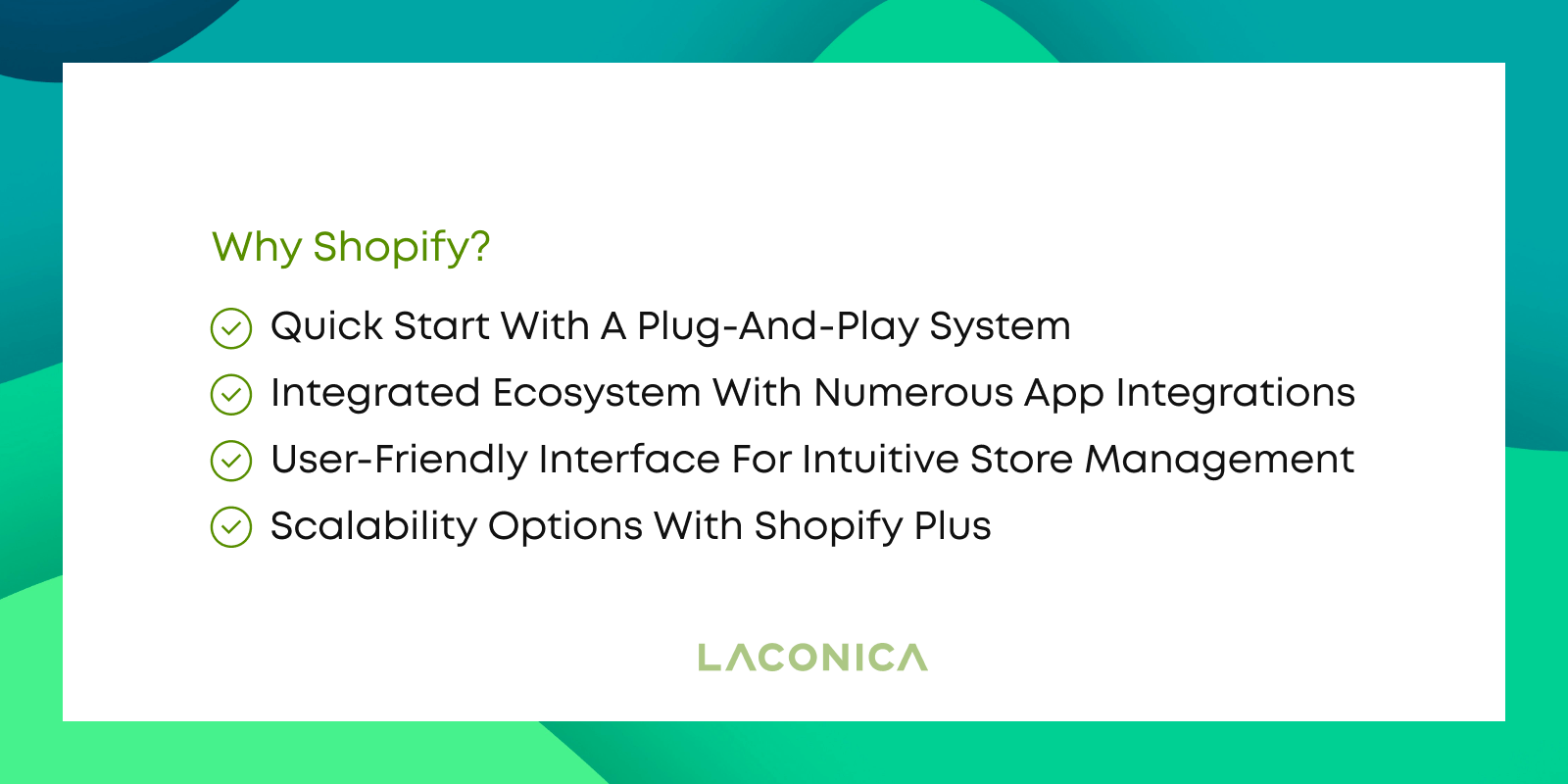
So, if you serve a small number of customers and are looking for a simple solution to streamline the entire cycle, from launch to further maintenance, you need Shopify development services. Otherwise, Magento is a go-for choice.
Magento: Power & Customization
Magento, an open-source system, is aimed at companies interested in growth, requiring high flexibility and unique customization, and looking for a solution that can give them 100% control over e-commerce operations.
Magento in Numbers:
- Over 10-15% of the largest e-commerce companies worldwide have chosen Magento, which has fully met their high-scale expectations.
- Magento-based web stores boost conversions by 30-35% due to optimized backend speed and a uniquely customized frontend, leading to improved user experience.
By the way, we have some good news for you. As you might know, some companies used to complain that Magento’s overloaded frontend could slow down the website’s speed. Now, however, the problem is over, and your project isn’t at risk anymore. All you have to do is implement the Hyvä theme, which skyrockets the online store's performance by minimizing JavaScript usage and leaving only crucial third-party dependencies.
Explore all Hyvä benefits in this highly nuanced article. Follow the link if you’re interested in details.
As a Silver Partner of Hyvä, Laconica has access to additional perks and valuable bonuses of this innovative front-end solution, which we can use for our clients’ benefit. After all, switching to a new theme is a much more cost-effective project than a full-fledged Magento to Shopify migration.
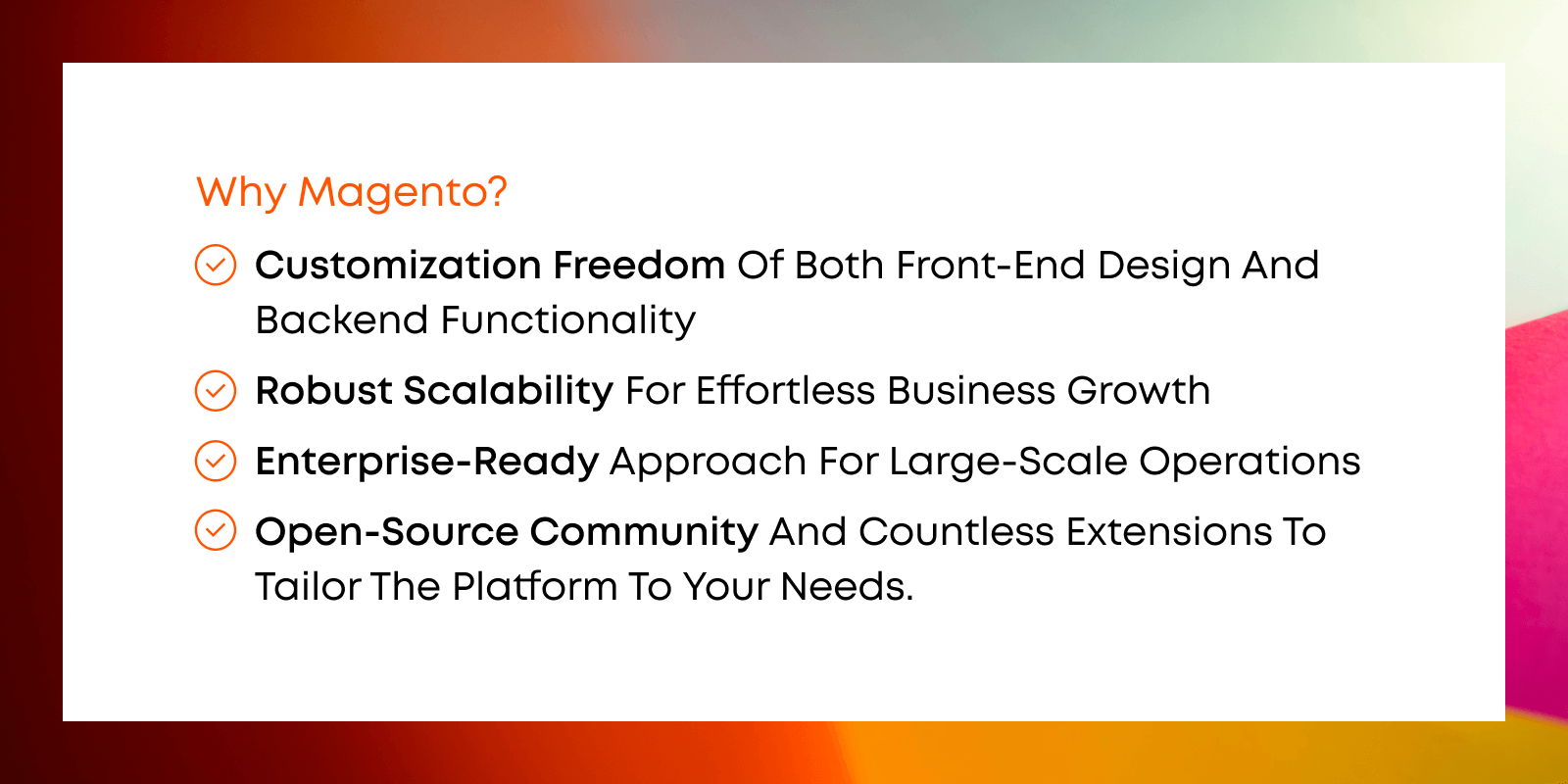
Magento vs Shopify: Choosing the Best Platform for Your Business
#1. Scalability: Adapting to Your Growth
Our Shopify vs Magento comparison has reached a very important point: scalability. Let's face it: even if you didn't initially plan to develop your e-commerce project, the situation might change, leading to a traffic boost, catalog extension, and other factors accompanying business growth. Are Shopify and Magento ready for this increased load?
In short, yes, they are, although Shopify and Magento approach the scaling issue differently. Let's figure out how exactly.
Shopify: Scalability with Simplicity
As you may have already understood, Shopify focuses more on startups and small and medium-sized businesses. However, this doesn’t mean the platform has no plan for your possible growth.
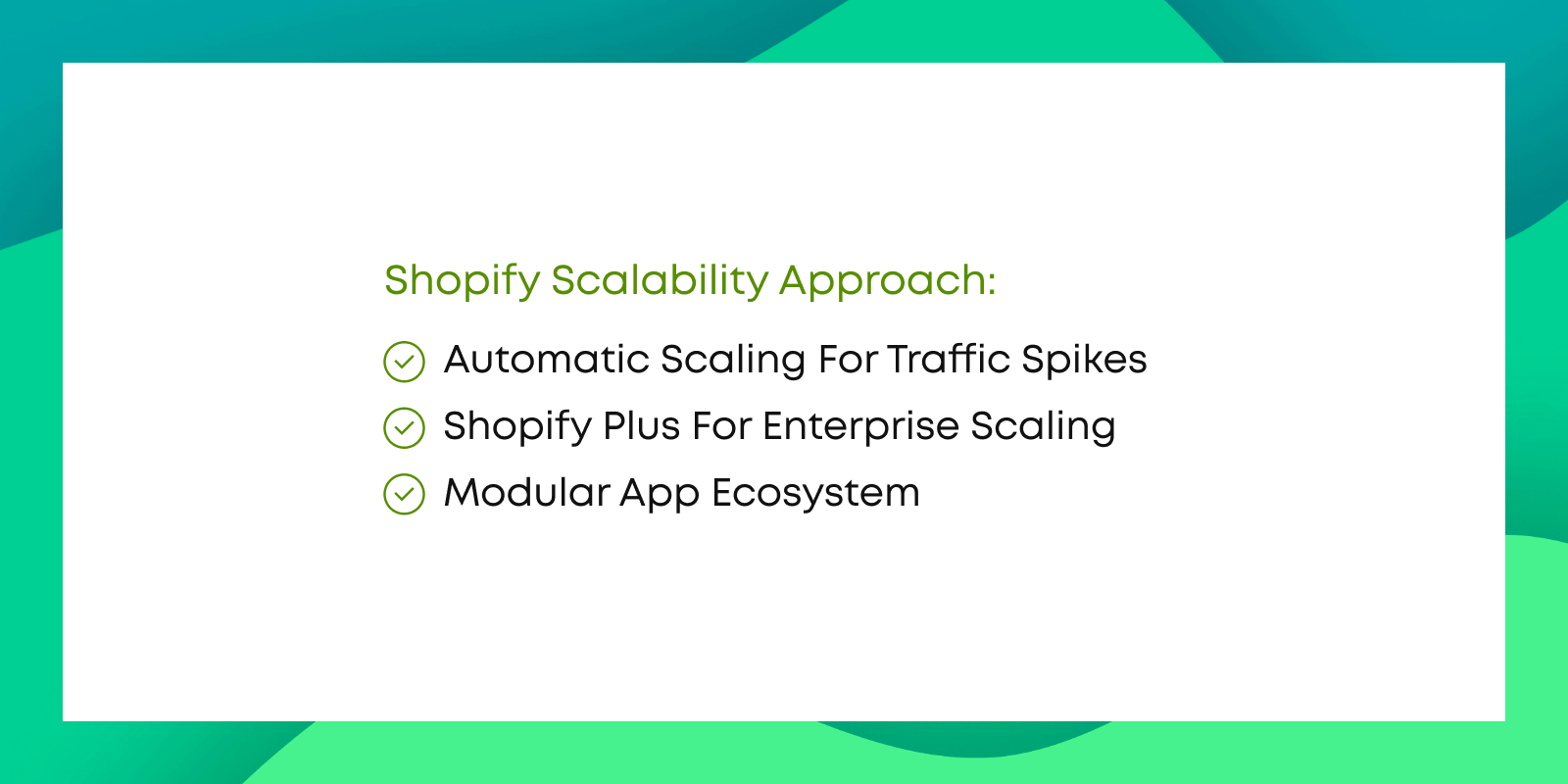
First, Shopify supports peak loads, which are inevitable for any e-commerce business that deals with heavy holiday sales and gift-giving periods. The platform also offers a large library of apps to extend the functionality of your online store as you scale your business.
But if we're talking about big games like enterprise scaling, then you’ll have to subscribe to Shopify Plus, which comes with higher costs. Alas, nothing else will do.
Scaling Challenges
As they say, there's a flip side to everything, and in Shopify's case, it's limited customization options. And you may need these options because business growth means new requirements and responsibilities that even the extensive library of Shopify apps cannot always fully meet as Magento does.
Also, keep in mind that you'll likely need Shopify development services, especially if you want to create a unique user experience.
Magento: Scalability with Customization
Unlike Shopify, Magento provides perfect conditions for unparalleled business growth, which makes it a great solution for e-commerce enterprises. It covers the most tricky workflows that become more complex as your company scales.
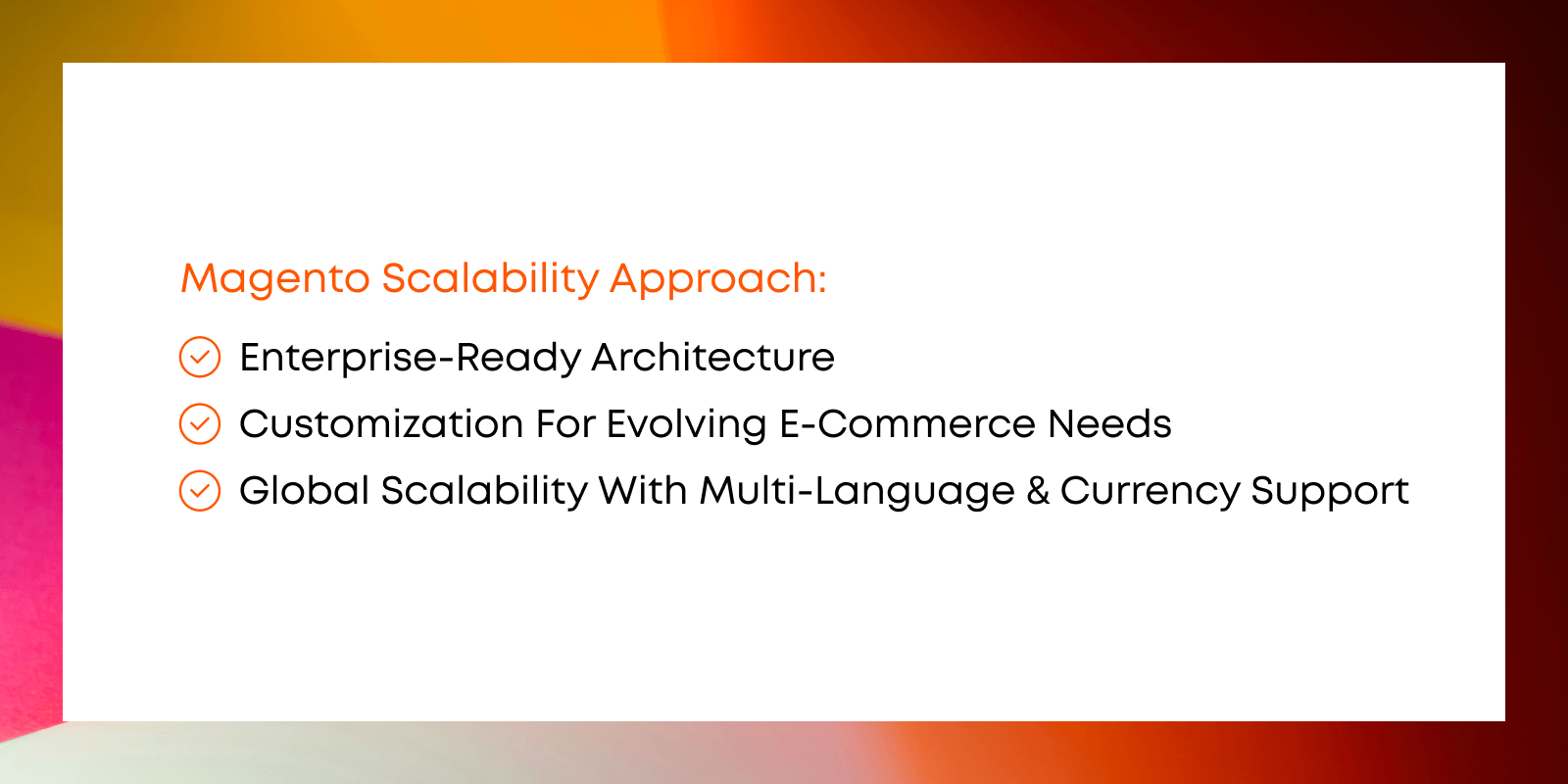
To sum it up, Magento is fully prepared for any surprises following business growth, including the company's possible entry into foreign markets (hence the support of different languages and currencies). You can easily add new features and implement complex integrations, knowing that your online store will withstand greater traffic and cope with the influx of customers even on Black Friday.
Scaling Challenges
Since Magento is a self-hosted platform, you must set up and maintain a server infrastructure. This can be rather costly, especially as your business becomes bigger and requires supporting more customers and products (which means increased data processing).
Shopify vs. Magento: Which Fits Your Scaling Plans?
In terms of project scalability, the choice between these two platforms is simple:
- Consider Shopify if you need an easy-to-manage solution that handles traffic spikes but operates within a predefined scaling framework (with the ability to expand your e-commerce capacity with Shopify Plus)
- Go for Magento if you're looking for a platform that can easily deal with large-scale operations and adapt to increasingly complex conditions and global markets.
As we've already told you, if you understand that your chosen platform poorly fits your scaling goals, don’t worry—just make a switch: it's not easy but quite feasible. For this, initiate a Magento to Shopify migration or, conversely, move to Magento. It all depends on your growth plans and related needs.
#2. Ease of Use: Balancing Simplicity and Control
Sure, scalability is important, but it's not the only choice-determining factor. You have to manage your online store and work with it daily, and it's best if you do so as easily as breathing.
What can Magento and Shopify offer us for further management and maintenance?
Shopify: Designed for Ease of Use
If ease of use is your main concern, then Shopify is definitely the way to go, as it applies a plug-and-play approach and caters to customers without tech skills. As a SaaS platform, Shopify takes care of every detail of your journey and offers a step-by-step onboarding process.
Magento: Built for Control
Magento is not as easy to use as Shopify and requires some technical knowledge and expertise. That's the fair price of higher flexibility and wider customization options.
Also, don’t forget about Magento's self-hosted nature, which somehow complicates online store management, too.
However, if you run a large e-commerce company, you 100% have an IT department, so they will be the ones handling all the technical stuff.
Ease of Use: Shopify vs. Magento at a Glance
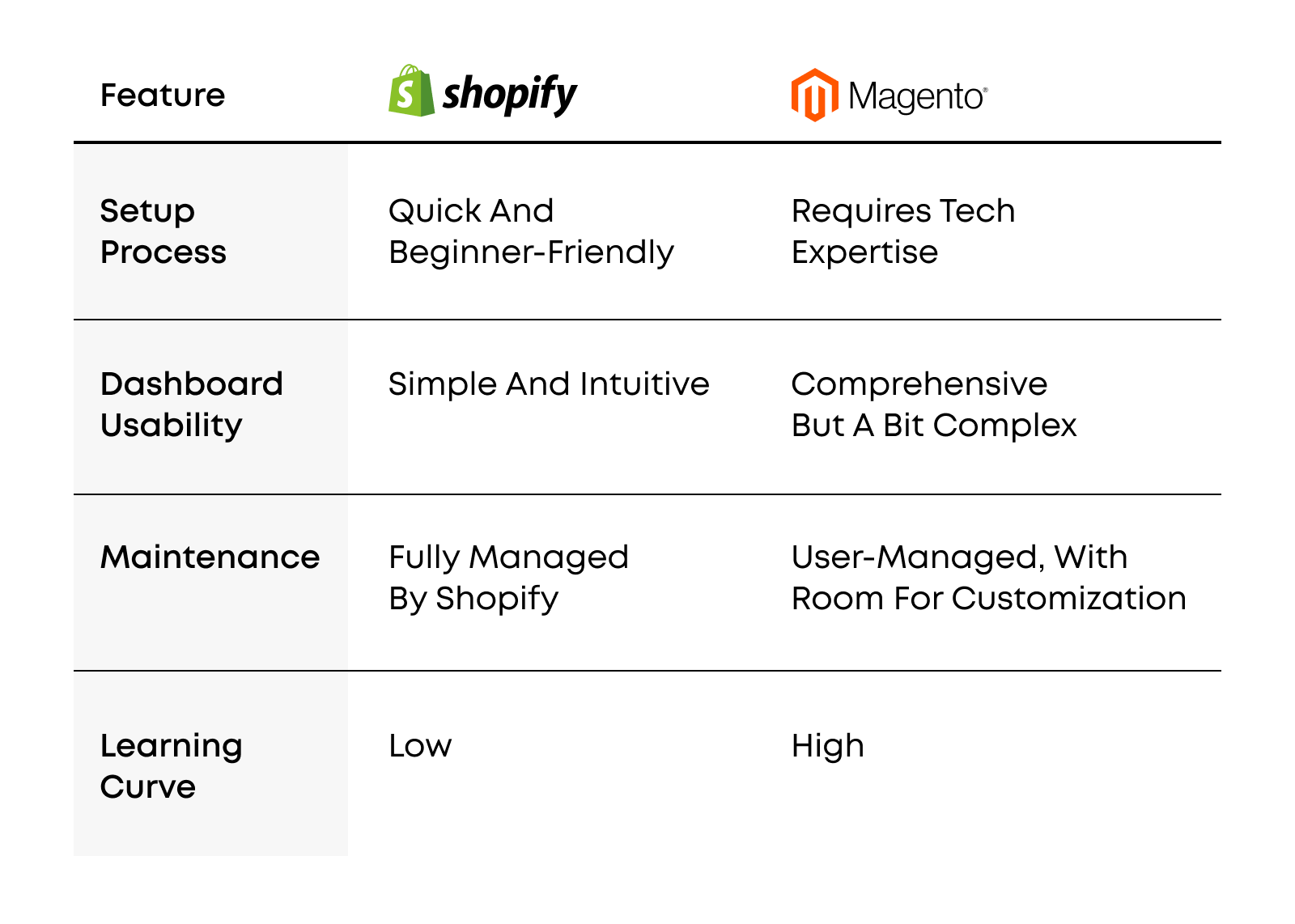
#3. Cost: Investment vs. Long-term Value
The Shopify vs Magento discussion would be incomplete without touching on the cost issue. You must plan your budget in advance, so we can’t avoid the money topic.
Shopify: Predictable Subscription-Based Pricing
- Subscription: Shopify works on a subscription basis, which means monthly payments for a selected plan, from €27 to $2,300 for enterprises (as of the end of 2024). The more affordable the plan, the fewer options you get (for example, additional staff accounts or greater checkout capacity). P.S. Be sure to consider possible transaction fees per sale.
- Development Costs. You may need to pay for Shopify development services to launch your e-commerce project and customize it to your unique needs.
- Fees for Apps. If you want to expand your online store's capabilities with additional apps and integrations, you will most likely need to allocate more money. Shopify provides a wide choice of solutions, but not all of them come for free.
Magento: Flexible yet Complex Pricing
- Open-Source Magento: This free to install option, however, requires considerable costs for maintaining the server infrastructure. The price of hosting is difficult to predict in advance, everything depends on your needs. Most often, it’s between ten and five hundred dollars per month.
- Magento Commerce: For those who need even more large-scaling features, there is Magento Commerce (aka Adobe Commerce). And that's where licensing fees of at least $20K per year come into play.
- Development & Maintenance: As you already understood from our previous story, Magento requires certain technical skills, so you’ll have to hire a team of experts to manage the platform. And their services aren’t free, either.
Decision Framework: What Should It Be, After All?
Our Shopify vs Magento comparison is over, and it’s time for final thoughts.
So… what should you choose for your online store?
- Shopify is perfect for startups that need a quick start and are interested in a simple solution. Plus, this platform offers more understandable and calculable pricing, which is also an advantage for beginning entrepreneurs. As for medium and small e-commerce businesses, they choose Shopify for its hassle-free approach and clear nature.
- Magento may seem like an expensive and tough-to-manage solution with higher upfront investments, but it ensures more freedom and flexibility, hence the cost. It's a great option for large companies that focus on customizability to automate complex processes and scalability to support their long-run growth plans.
At Laconica, we've partnered with e-commerce businesses for over a decade, delivering a wide range of software engineering solutions — from building online stores from the ground up to handling complex migrations and modernization efforts. To illustrate our expertise, we’ll share a real-world example of a Magento to Shopify migration project we successfully completed.
Shopify vs Magento in Real-Life
One of our recent clients, a mid-sized D2C brand selling customizable office supplies, approached us with a clear mission: migrate away from Magento 1, which was becoming increasingly expensive and time-consuming to maintain.
However, they weren’t convinced about moving to Shopify right away.
The client had concerns about platform flexibility, especially regarding their custom product configurator and integration with a legacy ERP system. They also feared losing control over hosting, data access, and backend customizations — things they had full ownership of with Magento.
We stepped in to evaluate both options with them.
Magento 2 was considered but ruled out due to the high cost of development and infrastructure and the long implementation timeline. Meanwhile, Shopify (plus Shopify Plus) offered a managed, scalable environment with a shorter time to market. We demonstrated how much of the customization could be rebuilt using Shopify’s native capabilities and app ecosystem and where it made sense to build custom apps.
Ultimately, the client chose Shopify and never looked back.
We handled the Magento to Shopify migration end-to-end, including data transfer, redesign, and development of a lightweight custom configurator.
Conclusion
The above example is just one of many projects our Laconica has completed over 10+ years in the e-commerce development market. And not always did clients choose Shopify—for some, Magento 2 proved to be a better option. Each situation is unique and requires proper analysis.
If you want expert help with the final platform choice, you're welcome to Laconica! Our expert team is happy to consult you on all issues and advise you on the best course of action.
More articles
Have a project in mind?





